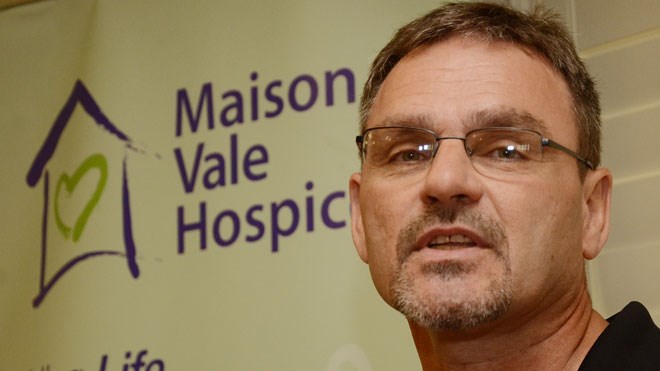A report from Ontario's auditor general that said access to palliative care services is not equitable across the province came as no surprise to Léo Therrien.
The executive director of Maison Vale Hospice said all three parties in Queen's Park agree there needs to be more funding and support for hospice palliative care in Ontario.
The auditor general's report said Ontario has no integrated and co-ordinated system to deliver palliative care services to an aging population.
“Ontario’s palliative-care services developed in a patchwork fashion, often being initiated by individuals who had a passion for this area of care,” said Ontario auditor general Bonnie Lysyk in a press release.
“The challenge for the Ministry of Health and Long-term Care is to build on this platform. The Ministry does not have adequate information on patient needs in various areas of the province or what services are available for them to be able to provide the right care at the right time in the right place."
The province only started to fund hospice palliative care in 2005, said Therrien.
There are now 37 hospices across the province, and 289 hospice beds.
But the auditor general's report said the province will need more than 755 hospice beds to meet the growing need for palliative care services.
The Liberals announced they will fund 20 more hospices across the province, but Therrien said they have not yet implemented that plan.
Sudbury and Sault Ste. Marie are the only cities in Northern Ontario that have their own hospice.
Therrien said North Bay and Thunder Bay would be potential candidates if funding becomes available for 20 more hospices.
The auditor general report said acute care in hospital costs more than twice as much as palliative care in a hospice setting, and 10 times more than providing the same kind of care at home.
“Right now, 12,000 people a year in Ontario die in hospital, needlessly, simply because they can’t stay at home and there is nowhere else for them to go,” the auditor general said. “And that number will increase. We know that more capacity has to happen now to meet the immediate need, and the imminent need.”
Another report, by Health Quality Ontario, an independent government organization created under the Commitment to the Future of Medicare Act, said palliative care in the province needs dramatic improvements to provide quality care for patients.
By 2026, the number of Canadians dying each year will increase by 40 per cent to 330,000 people, with each death affecting the well-being of five other people on average, or more than 1.6 million people in all, the report said.
The Health Quality Ontario report said more health-care professionals need to be trained in specialized care for the dying.
It also called for the need to facilitate conversations about dying – with loved ones – to better ensure people's needs and final wishes are met when they die.
“Patient choice and preferences are essential to the delivery of high-quality care,” Dr. Joshua Tepper, president and CEO of Health Quality Ontario, told the Canadian Press.
-With files from CP
Join Sudbury.com+
- Messages
- Post a Listing
- Your Listings
- Your Profile
- Your Subscriptions
- Your Likes
- Your Business
- Support Local News
- Payment History
Sudbury.com+ members
Already a +member?
Not a +member?
Sign up for a Sudbury.com+ account for instant access to upcoming contests, local offers, auctions and so much more.
